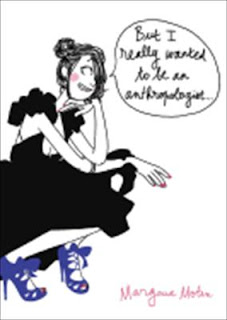This is the blog of comics critic Rob Clough. I have writings elsewhere at SOLRAD.co, TCJ.com and a bunch more. I read and review everything sent to me eventually, especially minicomics. My address is: Rob Clough 881 Martin Luther King Junior King Blvd Apt 10 i Chapel Hill, NC 27514
Tuesday, November 13, 2012
Sexe Et La Ville: But I Really Wanted To Be An Anthropologist
Margaux Motin's But I Really Wanted To Be An Anthropologist... (Self-Made Hero) is the embodiment of descriptions like "slight" and "breezy", at least at first glance. As Motin whips one rapid-fire series of anecdotes and gags after another at the reader, what emerges is a book that simultaneously embraces and gently sends up "chick-lit" entertainment along the lines of Sex and the City. The French cartoonist brings the expected bawdy and raunchy details one might expect from such a work, but Anthropologist also takes on a frequently amusing scatological bent as well as a surprisingly tender account of being in a committed relationship and having a young daughter. The format is essentially along the lines of a classic, Lynda Barry-style one-year journal comic. From the very beginning, Motin portrays herself as sexy and silly, with her delicate and amusing drawings given sometimes lurid emphasis by strategically coloring her panties, shoes and fingernails bright red. Motin isn't afraid to treat herself as the butt of jokes, though she gives as good as she gets from those around her.
Motin's mission seems to be depicting the notion that there's no contradiction between being a fashion-obsessed woman, an intellectual, an artist, a lover and a human being with typical bodily functions and the sense of humor of a ten-year-old boy. Her post-pregnancy body image is still a big topic of concern for her, even several years after the birth of her daughter. There's a Carol Tyler-style drawing of the post-pregnant body in all of its depleted "glory"; it's a sharp contrast to her normally cute, angular self-caricature. Indeed, her thinness is a concern for her, especially the way in which her breasts essentially disappeared after nursing. It's played for laughs, like when a clerk at a shop essentially feels her up and declares her to be a size AA, but there's a real sense of anger there as well. Motin also struggles with motherhood in a way that tries to play off her guilt in a series of gags, like one called "Unfit Mother" where she simply ignores her screaming child and denies that she's her mother. That's a running emotional motif in the book: uncomfortable emotions get played off as jokes that aren't really jokes. Motin seems reluctant to get at deep emotions in a serious manner in her journal, perhaps because of a need to constantly entertain. There's also a sense that she knows she has a good life and doesn't want to complain too much, for fear of being whiny. That's why her most melodramatic moments tend to be about superficial things, like clothes, and more serious issues (like her issues with her own mother and fears about debt and her career) tend to be more light-hearted.
A lot of the humor in the book (especially very typical "men and women are different" jokes) are given some extra lift with the level of verisimilitude she packs into every page as well as her skill as an illustrator. Just looking at this book is highly pleasurable, and the fact that its production values are quite high certainly helps it. When she uses spot colors, they pop off the page and add a lot to her gags. Indeed, many of her jokes depend on color, like one where her daughter announces the color of Motin's underwear matching that of fruit at a grocery store. That gag works because the bright red panties and bra, a symbol of Motin's elegance and sexiness in one panel, are suddenly revealed to the world in a less-than-flattering manner. Motin's observations aren't as deep as those of Tyler's or as laugh-out-loud funny as Julia Wertz's; instead, they occupy a sort of middle territory between those artists by way of the cheerful autobio comics of Vanessa Davis. Not every autobio or journal comic has to have deep tragedy at its core to be effective, if the author is willing to still reveal something about themselves and their life. While I wouldn't call Motin's work essential reading for this corner of comics, there's no question that she's a fine cartoonist whose point of view, obsessions and experiences will resonate with a number of readers.



No comments:
Post a Comment